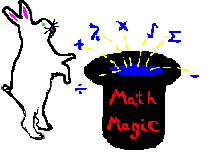

A. An inverse of a function, usually written as f -1(x), is a reflection of the original function, f(x), around the line y = x. Basically, every x value is changed to a y value and every y value is change to an x value.
B. To find a function's inverse, simply switch the x and y variables and solve for y.
C. Number sense usually deals with inverses in one of three ways:
1. The inverse of the function: f(x) = ax + b, is: f -1(x) = x-b/a or 1/ax - b/a.
Ex [1] If f(x) = 2x + 4 and f -1(x) = ax + b, then a = ____.
a. For 'a' the answer is 1/a or 1/2.
b. If the question had asked for 'b' then the answer would be -b/a or -4/2 = -2.
Ex [2] If f(x) = x - 5, then f -1(3) = ______.
a. In this problem we have to first find f -1(x) then find f -1(3).
b. f -1(x) = x + 5. So f -1(3) = 3 + 5 = 8.
c. The answer is 8.
2.
![]() . Notice,
b and c remain the same and d and a are switched and their signs are changed.
. Notice,
b and c remain the same and d and a are switched and their signs are changed.
Ex
[1] ![]()
a. In this problem 'c' stays the same, so c = 2.
b. If the problem had asked for 'a' the answer would have been -(-4) or 4. 'b' stays the same, so 'b' = 4. 'd' would be -3.
Ex
[2] ![]()
a. In this problem we have to find f -1(x) first.
b. If you notice, f -1(x) = f(x). There is no change. So all we have to do is plug in 4 to the equation. Doing so gives 3(4)+5/4-3 = 17.
c. The answer is 17.
3. For this last type of problem, you need to switch the x and y variables and solve for y to find the inverse.
Ex [1] If 3x - 4y = 2 and y-1 = ax + b, then a = ____.
a. In this case switch the x and y variables and solve for y. So we get 3y - 4x = 2.
b. Solving for y we get 3y = 4x + 2 or y = 4/3x + 2/3.
c. The answer is 4/3.
Ex [2] If 5y + x - 2 = 0, and y-1 = ax + b, then b = _____.
a. Switching the x and y variables we get 5x + y -2 = 0.
b. Solving for y we get: y = -5x + 2.
c. The answer is 2.